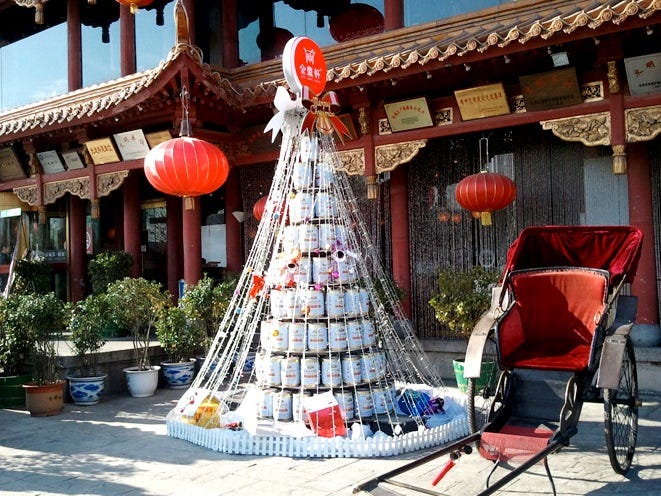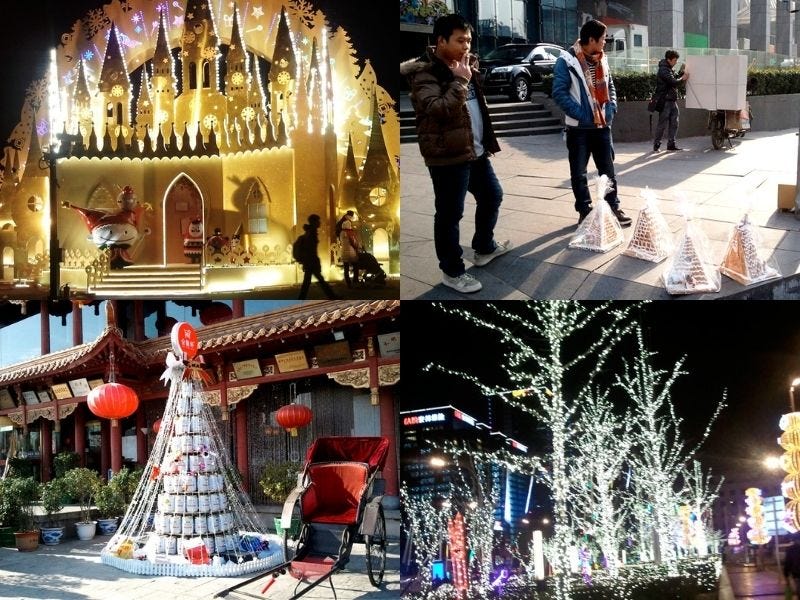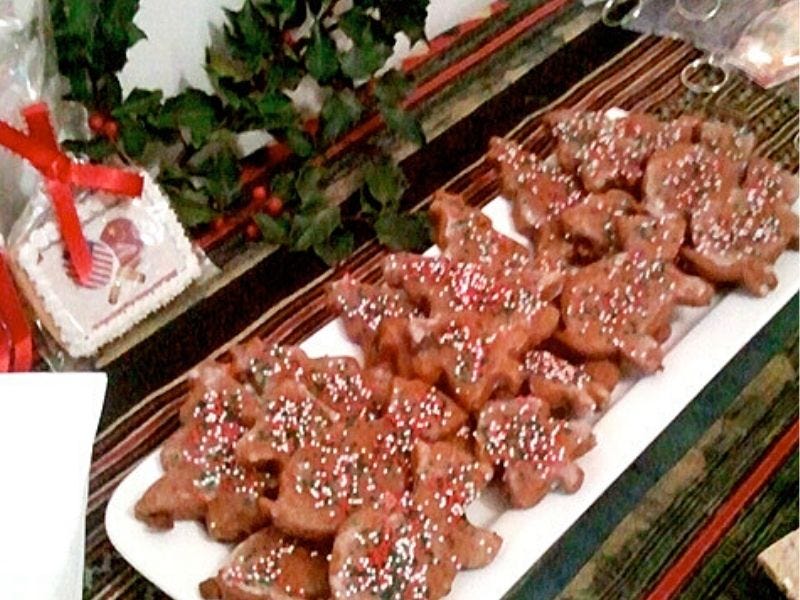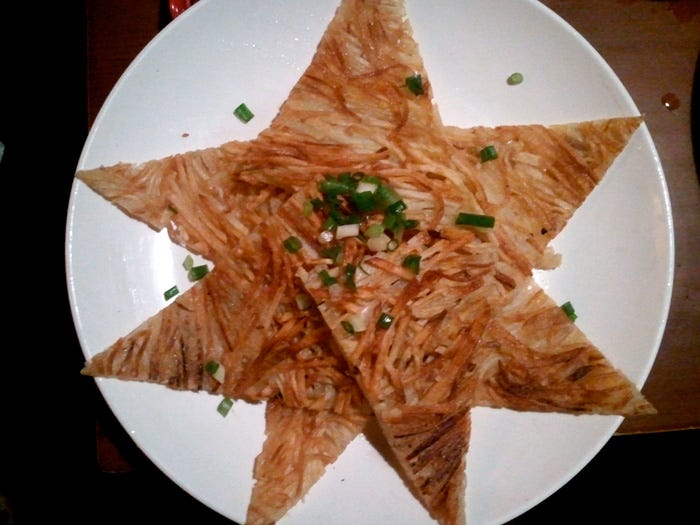In late 2007, my assistant and I arrived in Shanghai. It was dark by the time we got to the hotel. She was coming down with flu and I was in the liminal state that comes with jetlag and smells and sounds of another culture. When we walked into the lobby and saw a silver Christmas tree and heard Perry Como singing, “I’m Dreaming of a White Christmas,” I thought I was dreaming.
But that was before I realized how extensively the Chinese have adopted Christmas, Valentine’s Day, and now even Halloween. This has implications for foreign policy: the personal really is political.
Let me show you a bit more of what I saw in China on trips during the holiday season, along with a video from a Christmas party we gave in Beijing in December 2012. I particularly like the young guys, smoking while they try to sell gingerbread Christmas trees outside a hotel.
Below, note the US-China cookies that I brought from home, picked up an event celebrating an anniversary of ping-pong diplomacy. Recipes for the cookies and spiced popcorn I served that evening are at the end of this letter, with photos of a few of the alternate ingredients I found in Beijing. (Yes, remembering those days, shopping and cooking and entertaining, makes me miss China!)
Cupcake Diplomacy?
There’s been a lot of talk about “soft power” and public diplomacy in recent decades, especially in connection with China and its “peaceful rise.” This 2018 article in Foreign Policy magazine provides a good overview, though it is wildly outdated now when it comes to China: “The Rise and Fall of Soft Power: Joseph Nye’s concept lost relevance, but China could bring it back.”
Soft power means influence based on attraction rather than coercion, while hard power ranges from tariffs to sanctions to armed conflict.
But war, hot or cold, has a high price tag. Improving global public opinion through soft power initiatives is cheaper and has less risk. The Peace Corps was the United States’s most successful public diplomacy initiative. Britain has the British Council, while Germany has Goethe Institutes. The Confucius Institutes were intended to spread the Chinese language and culture, increasing China’s influence around the world.
But global opinion isn’t just based on what governments do. Sports, music, books and movies, and foods are important forms of soft power. Their diffusion across the globe is similar to the way religions spread - often by word of mouth. Humans adopt useful and attractive ideas, whether a tool or a belief system, especially when those ideas can be adapted to local circumstances.
This year, on October 31, small children dressed as witches and ghosts were being escorted around their apartment complexes in Beijing, trick-or-treating. It looked not unlike a scene in my Massachusetts neighborhood.
No Western movies are being permitted in China today and foreign book translations are under new scrutiny. But Halloween is taking hold.
This is soft power. It works by the osmosis that has shaped human history and human destiny. Much of what has mattered in history hasn’t been imposed from the top. We adopt tools that work, foods that taste good, and activities that are pleasurable. Successfully diffused religions, sports, and foods are those with appeal across cultures. Somehow, fortuitously, Europe and the United States came up with festivals that travel well.
In part, this is because our festivals have bright, recognizable symbols. Great branding, you might say. We even seem to have done especially well with holiday colors. Christmas is red and green, Easter is rainbow pastels, Halloween is orange and black.
China tends to stick with red and yellow for everything. It has a huge range of holidays of its own, from the Spring Festival and Dragon Boat Festival to Tomb Sweeping Day (my favorite!). But none has great potential for global adoption. Western holidays are both attractive and adaptable. They have symbols that are easy to grasp. They come with stories and music and activities. They are uplifting.
If we can get our acts together, democratic countries might take heart, and think about new soft power efforts as a way to shape global opinion. A sense of what we all have in common is crucial to dealing with climate change, so if we need to enlist Santa Claus and the Easter Bunny, let’s do it.
Last week’s “Know when to fold ’em,” seems to have resonated. Thank you for the thought-provoking comments and emails. And here’s wishing you a Happy Christmas and New Year!
Warm regards, Karen.
PS I went to a splendid combined celebration of Hanukkah and Thanksgiving last month. It was a truly wonderful party. (The roast turkey with latkes and apple sauce was revelatory.) Hanukkah and Thanksgiving are tied to a religion and a country, so they probably don’t have the same global possibilities as holidays that have their roots in seasonal or pagan celebrations. But who knows? I was served this dish at a Yunnanese restaurant in Beijing. It would be great on a Hanukkah table.
Here are my notes from that Christmas in Beijing.
Gingerbread Cookies
¾ cup (about 2/3 of a 250g packet) unsalted butter
1½ cup very dark brown sugar – I used entire 400g package, which was roughly the same amount
1 cup golden syrup
2 large or 3 small eggs
Flour mixture: 6 cup white flour, 1 teaspoon baking powder, a little salt, and spices of choice including plenty of powdered ginger. I used a package of “Gingerbread” mix (see photo below). I would otherwise use powdered ginger (the dominant flavor), cinnamon, nutmeg, and cloves or allspice.
Powdered/icing sugar
Beat together softened butter and sugar, then add syrup and eggs, beat thoroughly. Fold in flour mixture and blend. Chill for an hour then roll and cut out. Thick cookies are softer and chewier, while thin are crisp and easy to hang. If you plan to hang them on a tree, cut a small hole before baking.
Bake at 180C for about 8 minutes (depends on oven – check the first batch frequently). Cool thoroughly, then ice with simple mixture of icing sugar and water. A little lemon juice is a nice addition. It can be thick and white, or just a translucent glaze. Add colored sprinkles if you like.
Norwegian Nut Crescents
3/4 cup chopped nuts (Chinese roasted pecans worked beautifully, but raw almonds or walnuts seem to be standard)
3/4 cup powdered/icing sugar
3/4 cup unsalted butter, softened
1 t vanilla
About 1-2/3 c flour (enough to make a firm dough)
Combine all ingredients thoroughly, chill the dough until it is firm. Roll small balls of dough between your palms. They’ll naturally be thicker in the middle and thinner at the ends. Shape into crescents and place on a baking sheet. Bake at 180C until faintly brown, about 10 minutes. Watch carefully because they are much nicer if not overbaked. Allow to cool a little, release from tray with care, and roll in powdered/icing sugar. These cookies are firm in the hand, but melt in the mouth.
Beijing Party Popcorn
We tossed a big bowl of popped corn with a little melted butter and then seasoned it with this mixture:
Salt
Powdered cumin
Cinnamon
Cayenne or chili powder, or paprika
A little sugar











Hi, I like so much your sharing! Cookies, made with love remain in our taste memory. Christmas trees remind our sweet moments with our loved ones. To share all these is to share the cultures, traditions, and habits of different civilisations. Unfortunately, the Chinese government has new rules to limit Christmas celebrations in China. Should we embrace the world culture and share the joy! Catherine